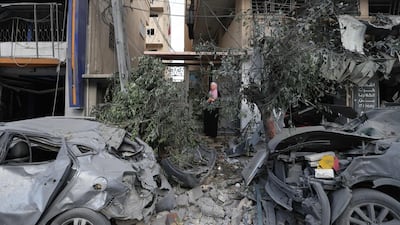Live updates: Follow the latest news on Israel-Gaza
A sustained increase in energy prices due to the Israel-Gaza war could affect global economic growth, although it is too early to make any assessment, the International Monetary Fund said on Tuesday.
The conflict led to sharp surge in oil prices on Monday, with Brent crude settling 4.22 per cent higher at $88.15 a barrel and WTI closing up 4.34 per cent at $86.38 a barrel.
Prices on Tuesday are slightly down as traders weigh the impact of the war on supply.
"One of the things we have observed already is that oil prices have increased somewhat over the past few days, by about 4 per cent," Pierre-Olivier Gourinchas, director of research at the IMF, said at a press briefing on the sidelines of the IMF-World Bank annual meetings in Marrakesh on Tuesday.
"We see often in situations where there is geopolitical instability in the region ... we see spikes in energy prices, in oil prices. We have seen that in the previous crises and conflicts. This reflects the potential risk that there could be of disruption in transportation or production of oil in the region," he said.
However, it is too early to assess how much of those movements in oil prices will be sustained, he said.
"The work we have done at the research department at the fund suggests that if there is something like a 10 per cent increase in oil prices, this would weigh down on global output by 0.15 per cent in the following year and will increase global inflation by 0.4 per cent," he said.
"This gives you the rough estimate of what the magnitude could be, but again, I emphasise that it is too early to jump to any conclusions here."
The conflict entered its fourth day on Tuesday, with the death toll from both sides exceeding 1,500.
"We obviously are very saddened by the loss of life that we're witnessing and we're monitoring very carefully the situation in terms of the economic impact it could have on the region and beyond," Mr Gourinchas said.
"I think we have to be cautious. I think it's too early to really assess what the impact might be. And, of course, this happened after our round of current predictions was closed," he said.
"Of course, we will hope for rapid de-escalation of the conflict."
The clashes also caught markets off guard at the weekend, resulting in large inflows into gold and the US dollar on the back of safe-haven buying.
Meanwhile, major international airlines and cruise ships are either delaying or cancelling journeys to Israel this week.
As of Tuesday morning, about 47 per cent of flights were being cancelled to and from Tel Aviv’s Ben Gurion Airport and 41 per cent were delayed, according to real-time flight tracker platform Flightradar24.com.
Etihad Airways, Gulf Air, Cathay Pacific, Swiss Air, United Airlines, Delta Air Lines and American Airlines have also paused operations to Israel.
The IMF expects the global economy to grow by 3 per cent this year, unchanged from its July forecast, it said in its World Economic Outlook released on Tuesday.
Although the world economy has shown resilience this year, the economic activity still falls short of its pre-pandemic path, especially in emerging market and developing economies and there is divergence within the regions in terms of the pace of recovery, the Washington-based fund said.



























































